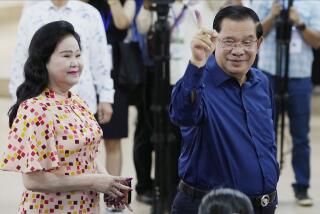Premier’s Stance Fuels Hope for Cambodia
- Share via
KUALA LUMPUR, Malaysia — Despite his often defiant public words, Cambodian strongman Hun Sen is showing signs of flexibility on key principles required for a settlement of the Cambodian crisis, the U.S. special envoy to Cambodia told Secretary of State Madeleine Albright here Saturday.
The apparent softening in the Cambodian leader’s stance has triggered the first tentative optimism among U.S. officials that his coup earlier this month may not have completely undermined the troubled country’s new democracy, an American official told reporters traveling with Albright. But the task ahead is still an uphill struggle, he added.
There is now “broad agreement” by Hun Sen and Cambodia’s other political figures as well as key regional and international players that all exiled political leaders, members of parliament and government ministers, including ousted First Prime Minister Prince Norodom Ranariddh, should be allowed to return, the official said in discussing the 3-week-old crisis.
All interested parties have also stipulated that any settlement will center on respect for the 1991 Paris accords that brought peace to Cambodia and on holding free and fair parliamentary elections no later than May 1998.
Despite conflicting signals and statements over the past four days, Hun Sen told envoy Stephen J. Solarz that he is willing to allow the Assn. of Southeast Asian Nations, or ASEAN, to mediate in the crisis, a sharp reversal from his earlier rebuff to the foreign ministers of Thailand, Indonesia and the Philippines, the official said.
The official predicted a negotiation process that would begin with a meeting between Hun Sen and the three ASEAN foreign ministers, followed by ASEAN shuttle diplomacy between Phnom Penh, the Cambodian capital, and exiled political leaders, and then potentially a meeting between Hun Sen and his rivals.
In contrast to prospects just a week ago, which the official described as “bleak,” a compromise now seems doable, the official said.
The impending ASEAN mediation effort offers real hope, he said, although he added that there are no guarantees that the process will be successful. “Whether that means there’s light at the end of the tunnel--or a tunnel at the end of the light--is the $64,000 question,” the official added.
The U.S. official said Hun Sen has three incentives to cooperate with diplomatic efforts: his quest for political legitimacy; his desire for Cambodia to become a member of ASEAN, a move that had been expected this month but became stalled after Ranariddh was ousted and at least 40 opposition figures were killed; and the country’s dependence on foreign aid for 60% of its budget.
The official urged donor nations to use aid as a lever to pressure Hun Sen. The United States has suspended aid and is pressing allies not to provide aid or at least make it conditional on behavior. But Japan, which provides half of Cambodia’s foreign aid, has already indicated that it is unwilling to withhold funds.
With the completion Saturday of Solarz’s weeklong consultations throughout the region, the United States is now calling for urgent ASEAN mediation. “The time for talk and analysis is through, and the time for mediation has begun,” State Department spokesman Nicholas Burns said at a news conference here.
Looming as the litmus test of Hun Sen’s long-term intentions is the scheduled vote this week in parliament for a new co-prime minister from Ranariddh’s FUNCINPEC party. Whether Hun Sen offers “proper incentives” for exiled members of parliament to return to vote will be a “very important standard,” Burns noted.
“This will tell whether his sweet words will be backed up by concrete actions,” Burns said.
At the ASEAN summit here of its nine member states and their major allies, the United States has been particularly encouraged by the “uniformity of views” on Cambodia, Burns said. “No one is content with the status quo,” he noted.
Although Cambodia remains the primary focus at the ASEAN summit, Albright also held talks here Saturday with Chinese Foreign Minister Qian Qichen amid growing signs that the upcoming U.S.-China summit in Washington, tentatively set for the last week of October, may result in significant breakthroughs on key issues.
At a joint news conference here, Qian said he hopes that the summit will be “more than just protocol.” And Albright said the ongoing dialogue is producing “tangible, clear and growing benefits.”
More to Read
Sign up for Essential California
The most important California stories and recommendations in your inbox every morning.
You may occasionally receive promotional content from the Los Angeles Times.













